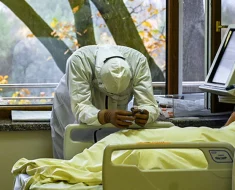Boys who grow up in privileged households produce more testosterone and may be at a greater risk of prostate cancer, study finds
- Boys who use less energy fighting off infection have more to put into growing
- Testosterone is important but very high levels may increase prostate cancer risk
- Scientists say the findings may help screen for illness risk as men grow up
Men who have privileged and disease-free childhoods grow up to have more testosterone, scientists say.
A study found the body is likely to put more resources into creating testosterone if it does not have to fend off serious infections or compensate for a poor diet.
Higher levels of the hormone can make men stronger and more fertile, but may also increase the risk of prostate enlargement or cancer.
Very low levels, on the other hand, can lead to infertility, a low libido or a lack of energy.
Researchers now say a man’s testosterone levels are ‘largely determined’ by his upbringing rather than his race or adult life.
This means boys who are healthy and well looked after in a safe environment are likely to have healthier levels of the hormone, but may also be more at risk of prostate problems.
Scientists say understanding the effects of men’s upbringings on their hormones may be a useful indicator of potential health problems as they grow older.

Boys who grow up in a safe and healthy environment are likely to have higher testosterone levels, a study found, but this may have negative effects later in life
The study, by scientists at Durham University, compared testosterone levels in Bangladeshi men who had grown up in the UK and those who had grown up in Bangladesh, and those who had moved between the two countries as adults.
Because the men had the same ethnicity, that could be ruled out for the reason for the difference.
The study found the men who grew up in the UK had significantly higher levels of testosterone than those who had lived in relatively well-off families in Bangladesh.
-

Teenagers and the agony of body image: Nearly all young…
Revolutionary ‘magic bullet’ for prostate cancer: Treatment…
Obesity fuels anxiety and depression by disrupting gut…
Doctors should prescribe a Saturday morning run instead of…
Share this article
The men in Britain also went through puberty earlier than their counterparts – an effect of higher testosterone levels – and were taller as men.
Researchers think the difference is because of the way the body uses energy in different environments.
Body produces less testosterone if it needs more energy to survive
They say in environments where disease or infection is more likely, or among people who have poor nutrition from their diets, the body may use more energy trying to survive.
Where the boys do not have to work as hard to stay healthy, their bodies have more energy to use on producing testosterone and growing faster, the scientists say.
Lead author of the study Dr Kesson Magid said: ‘A man’s absolute levels of testosterone are unlikely to relate to their ethnicity or where they live as adults but instead reflect their surroundings when they were children.’
High levels of hormone may increase risk of prostate problems
However, a higher level of testosterone may bring negative effects in later life.
WHAT IS TESTOSTERONE?
Testosterone is the male sex hormone and is mostly made in the testicles, but also in adrenal glands, which are near the kidneys.
It causes the voice to deepen, body hair to grow and the genitals to become larger during puberty.
As well as affecting sex drive and sperm production, it also plays a role in developing strong bones and muscles, and how the body distributes fat.
Women also create small amounts of the hormone in the ovaries and adrenal glands, and it affects their fertility and bones and muscles.
Testosterone levels which are too high or too low can cause various problems.
Low testosterone in men can cause erection problems, low sex drive, infertility, weakened muscles and bones, body fat gain and hair loss.
Too much testosterone, however, can trigger puberty in boys under the age of nine, is linked to aggression, and can increase the risk of prostate problems, including cancer.
Male testosterone levels tend to be highest when he is around 20 years old, and decline naturally with age.
Source: Medical News Today
Very high levels may lead to an increased risk of prostate diseases such as cancer, and have been linked to higher aggression.
Study co-author Professor Gillian Bentley added: ‘Very high and very low testosterone levels can have implications for men’s health and it could be important to know more about men’s childhood circumstances to build a fuller picture of their risk factors for certain conditions or diseases.’
The research measured the height, weight, age of puberty, testosterone levels and other health data of 359 men of Bangladeshi heritage.
The different groups measured were men who had always lived in Bangladesh; those who moved to the UK as children and grew up there; those who moved to the UK as adults; men born in the UK to Bangladeshi migrant parents, and UK-born Europeans.
The findings are published in the journal Nature Ecology and Evolution.
Low testosterone raises likelihood of chronic illness
Boys growing up in more poverty or more dangerous environments can be expected to have lower levels of testosterone, the study suggests.
A study by Michigan Medicine published in April showed low testosterone comes with its own downsides, as sufferers are more likely to get chronic illnesses.
The study involved men with and without testosterone deficiencies and looked for type 2 diabetes, arthritis, heart disease, stroke, chronic obstructive pulmonary disease (COPD), high cholesterol, high blood pressure and clinical depression.
The illnesses were more common among the men with lower than normal testosterone levels, researchers found, and the same men were also more likely to have more than one condition at once.
Source: Read Full Article





